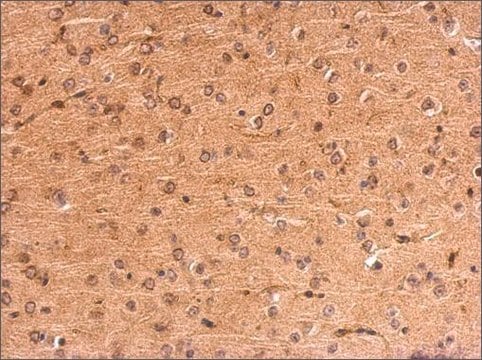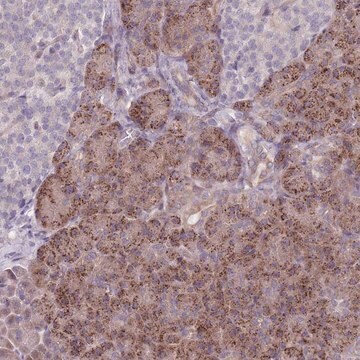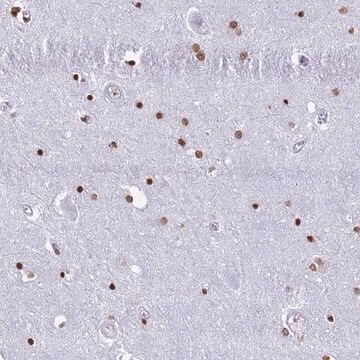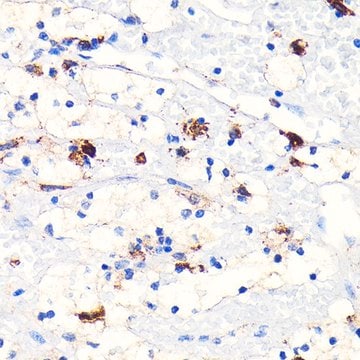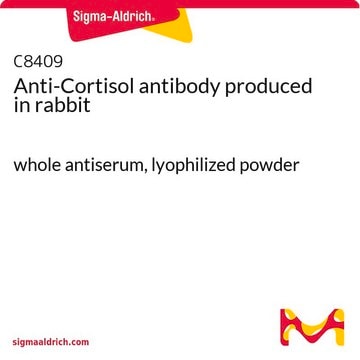M9193
Anti-Melanocortin 1 Receptor antibody produced in rabbit
affinity isolated antibody, buffered aqueous solution
Synonym(s):
Anti-MC1R
Sign Into View Organizational & Contract Pricing
All Photos(1)
About This Item
Recommended Products
biological source
rabbit
Quality Level
conjugate
unconjugated
antibody form
affinity isolated antibody
antibody product type
primary antibodies
clone
polyclonal
form
buffered aqueous solution
species reactivity
human
concentration
1 mg/mL
technique(s)
immunohistochemistry (formalin-fixed, paraffin-embedded sections): 2.5-7 μg/mL using human tissue
UniProt accession no.
shipped in
dry ice
storage temp.
−20°C
Gene Information
human ... MC1R(4157)
mouse ... Mc1r(17199)
General description
Anti-Melanocortin 1 Receptor is produced in rabbit using as immunogen a synthetic peptide conjugated to KLH. The peptide corresponds to the third cytoplasmic loop of human Melanocortin 1 Receptor. The antibody is affinity-purified using the immunizing peptide immobilized on agarose.
Anti-Melanocortin 1 Receptor specifically recognizes human melanocortin 1 receptor by immunohistochemistry in formalin-fixed, paraffin-embedded tissues. Not tested for other uses. The immunizing peptide has 88% homology with the mouse gene. Other species reactivity has not been confirmed. Expression of melanocortin 1 receptor has been reported primarily in adrenal, skin, and testis. ESTs have been isolated from breast, placenta, and testis libraries.
Anti-Melanocortin 1 Receptor specifically recognizes human melanocortin 1 receptor by immunohistochemistry in formalin-fixed, paraffin-embedded tissues. Not tested for other uses. The immunizing peptide has 88% homology with the mouse gene. Other species reactivity has not been confirmed. Expression of melanocortin 1 receptor has been reported primarily in adrenal, skin, and testis. ESTs have been isolated from breast, placenta, and testis libraries.
Immunogen
synthetic peptide corresponding to the third cytoplasmic loop of human melanocortin 1 receptor. The immunizing peptide has 88% homology with the mouse gene.
Application
Anti-Melanocortin 1 Receptor antibody produced in rabbit was used in immunoblotting for chondrocyte protein extracts at a dilution of 1:2000.
Biochem/physiol Actions
Melanocortin 1 receptor (MC1R) is a G-protein coupled receptor that regulates the proliferation and differentiation of melanocytes. The melanocortin hormones activate MC1R that in turn triggers ERK1/2 pathway that promotes the synthesis of eumelanin pigments. Overexpression of MC1R is reported in a majority of human melanomas and acts as a marker in these tumor.
Physical form
Solution in phosphate buffered saline containing ≤0.1 % sodium azide.
Disclaimer
Unless otherwise stated in our catalog or other company documentation accompanying the product(s), our products are intended for research use only and are not to be used for any other purpose, which includes but is not limited to, unauthorized commercial uses, in vitro diagnostic uses, ex vivo or in vivo therapeutic uses or any type of consumption or application to humans or animals.
Not finding the right product?
Try our Product Selector Tool.
Storage Class Code
10 - Combustible liquids
WGK
nwg
Flash Point(F)
Not applicable
Flash Point(C)
Not applicable
Choose from one of the most recent versions:
Already Own This Product?
Find documentation for the products that you have recently purchased in the Document Library.
Marta Abrisqueta et al.
Journal of cell science, 126(Pt 16), 3724-3737 (2013-06-12)
The melanocortin 1 receptor (MC1R) is a G-protein-coupled receptor (GPCR) crucial for the regulation of melanocyte proliferation and differentiation. MC1R activation by melanocortin hormones triggers the cAMP pathway and stimulates the extracellular-signal-regulated protein kinases ERK1 and ERK2 to promote synthesis
Judit Váradi et al.
PloS one, 12(1), e0170537-e0170537 (2017-01-20)
Alpha-melanocyte-stimulating hormone (α-MSH) is a potent anti-inflammatory peptide with cytoprotective effect in various tissues. The present investigation demonstrates the ability of α-MSH to interact with intestinal epithelial cell monolayers and mitigate inflammatory processes of the epithelial barrier. The protective effect
Magdalena K Kaneva et al.
British journal of pharmacology, 167(1), 67-79 (2012-04-05)
Melanocortin MC(1) and MC(3 ) receptors, mediate the anti-inflammatory effects of melanocortin peptides. Targeting these receptors could therefore lead to development of novel anti-inflammatory therapeutic agents. We investigated the expression of MC(1) and MC(3) receptors on chondrocytes
A A Rosenkranz et al.
Biochemistry. Biokhimiia, 78(11), 1228-1237 (2014-01-28)
The conventional chemotherapeutic treatment of malignant melanoma still remains poorly efficient in most cases. Thus the use of specific features of these tumors for development of new therapeutic modalities is highly needed. Melanocortin 1 receptor (MC1R) overexpression on the cell
Our team of scientists has experience in all areas of research including Life Science, Material Science, Chemical Synthesis, Chromatography, Analytical and many others.
Contact Technical Service

